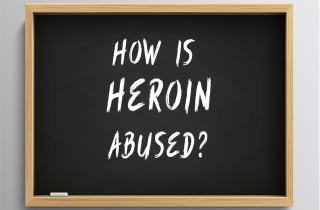People who use heroin do so for recreational purposes or because they are physically dependent or psychologically addicted to the illicit drug. Still, the primary way heroin is abused is injecting heroin because this is the fastest route of delivery. How does heroin works in the brain? By interacting with opiate receptors. Still, there are many ways that heroin is abused, including snorting heroin to get high or smoking heroin.
Continue reading to learn more about how heroin is abused and how to identify the signs of heroin abuse. Then, we invite your questions about heroin use or abuse in the comments section at the end.
Can heroin be abused?
Yes, heroin can be abused. In fact, if you are taking heroin at all, then you’re abusing it. Why? By definition, heroin is an illegal narcotic which is not regulated for use by doctors or medical experts. Heroin is one of the strongest opiates out there and is considered a Scheduled I narcotic by the Controlled Substances Act, which ranks the probability of heroin abuse and dependency as highly likely.
In fact, heroin is not meant to be taken for any reason. People who use heroin do so for recreational purpose or because they are addicted to the drug. Further, when you abuse heroin, you can develop a quick dependency and/or high opiate tolerance. And the more you continue to use heroin, the more severe the addiction.
How heroin is abused
For the most part heroin is injected into the bloodstream with the use of a needle. Others have abused heroin by snorting or smoking heroin. Is snorting heroin bad for you? Absolutely. These routes of administration still send the drug quickly to the brain and include additional risk of infectious disease.
Heroin abuse side effects
Heroin abuse will not only cause adverse side effects to your health and body, but will impact your daily life. Basically, heroin abuse greatly impacts your ability to be part of society. When you abuse heroin, you are more than likely only thinking of how to get your hands on the drug or to mitigate the dependency and tolerance your body has developed.
Physical side effects of heroin abuse include:
- collapsed veins
- coma
- death
- delirium
- depressed heart rate
- hallucinations
- HIV
- Hepatitis
- liver and kidney disease
- overdose
- slowed motor function
These are only some of the side effects from using heroin. Another thing to note is that heroin can alter your ability to feel pleasure and regulate mood. Many have a hard time withdrawing from heroin because of how painful this. Changes to your psycho-emotional like can affect your relationships and to those around you.
Finally, when addicted, you may do anything to maintain your heroin use. To the point of stealing or hurting yourself or other people to get your hands on the drug. Other side effects of heroin use that aren’t psychological or physical may include the following:
- homelessness
- increased participation in criminal activities
- legal issues
- loss of financial security
- prison terms
- ruined relationships
Signs of heroin abuse
If you suspect someone of abusing heroin you will begin to notice a wide verity of changes to their behavior. They may try really hard to keep their abuse secret. But, people who suffer from severe drug abuse can’t keep it under wraps forever. If you notice strange marks on their arms or legs that mimic poke marks from needles is a good start that someone may be injecting a narcotic. Other signs of heroin abuse include:
- altered moods (alternating between ecstatic and completely dissatisfied)
- disengaged from reality
- extreme and constant fatigue
- have needles on their person
- track marks
- withdrawal from family and friends
Heroin abuse questions
There are ways you can treat a heroin abuse. You are not alone. Please leave your questions about heroin use or abuse in the comments section below. We will try to respond to you personally and promptly.









Related Posts